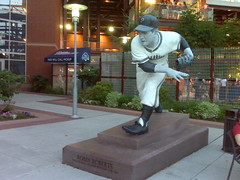 The national housing supply fell to a 2-year low last month, according to the National Association of Realtors®.
The national housing supply fell to a 2-year low last month, according to the National Association of Realtors®.
At the current sales pace, existing home inventories would sell out in 7.8 months -- 30 percent faster versus November 2008.
For a 10-month window, that's a major housing supply reduction and it helps to explain why multiple-offer situations have been so common lately.
Moreover, the same report from NAR showed sales activity reaching its highest point since July 2007, too.
If you're looking for evidence that the long-standing Buyers Market is ending, this month's Existing Home Sales report might be it.
Even median sales prices -- typically dragged lower by distressed and foreclosed properties -- declined at its slowest pace in a year. The market may have turned a corner.
Home prices are rooted in the basic economics of supply and demand.
- When supply outweighs demand, home prices fall
- When supply lags demand, home price rise
Since March 2009, the market has been moving in the right direction. Low mortgage rates, ample housing supply and a first-time home buyer tax credit fueled buy-side demand so that home prices are now rising in many U.S. markets.
If home supplies stay on this path into 2010, expect home prices to rise even more.
![Reblog this post [with Zemanta]](http://img.zemanta.com/reblog_e.png?x-id=d80b2e58-0fa2-4cab-b5f9-da7d9b0d5207)

![Reblog this post [with Zemanta]](http://img.zemanta.com/reblog_e.png?x-id=498f42aa-47f7-4018-bf3c-df7e318a47b8)
 Housing Starts on single-family homes gained last month, marking the 8th time that's happened this year.
Housing Starts on single-family homes gained last month, marking the 8th time that's happened this year.![Reblog this post [with Zemanta]](http://img.zemanta.com/reblog_e.png?x-id=70790d04-61cf-418b-8c3a-35cd63227a84)

![Reblog this post [with Zemanta]](http://img.zemanta.com/reblog_e.png?x-id=4d65d355-dda7-4822-b426-d7ccd6c0c120)
![Reblog this post [with Zemanta]](http://img.zemanta.com/reblog_e.png?x-id=11973525-d19b-48c8-9172-b87402c46ec1)
![Reblog this post [with Zemanta]](http://img.zemanta.com/reblog_e.png?x-id=13909c6d-1331-4226-bec7-fa306d2cc5b9)
 An
An ![Reblog this post [with Zemanta]](http://img.zemanta.com/reblog_e.png?x-id=a10209b1-8b33-4595-b8e4-1dca2cdea10f)

![Reblog this post [with Zemanta]](http://img.zemanta.com/reblog_e.png?x-id=1a4174c5-ec23-446a-8aa1-f3ba57930fab)

![Reblog this post [with Zemanta]](http://img.zemanta.com/reblog_e.png?x-id=99f4580a-517c-4918-b0c9-30ce8553372d)

